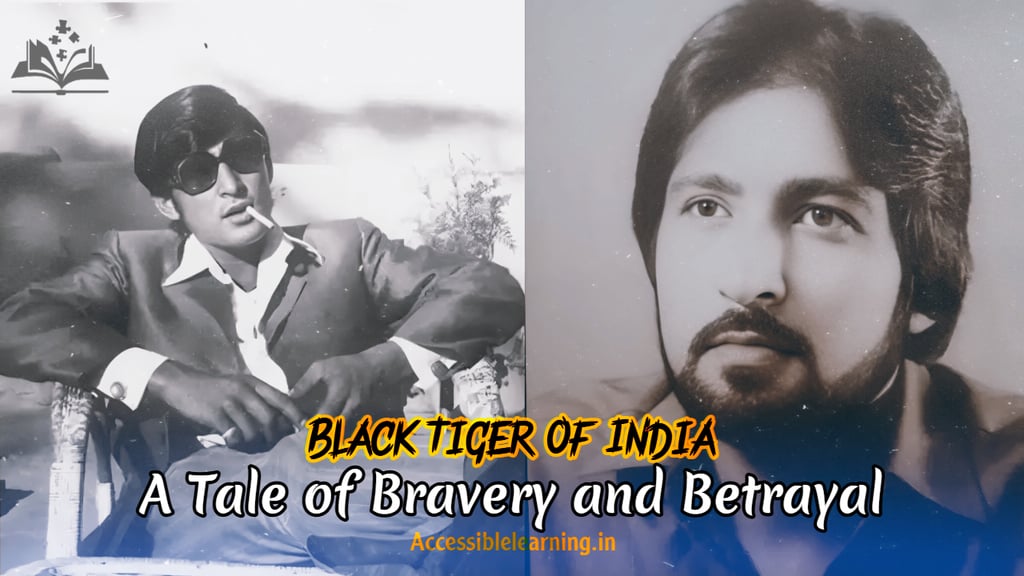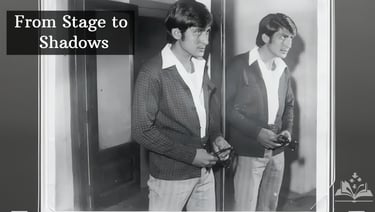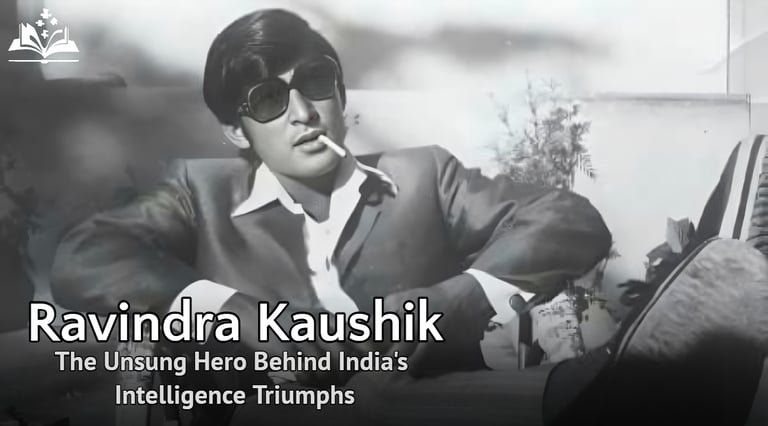
From Stage to Shadows: How Ravindra Kaushik Became RAW's Black Tiger?
Ravindra Kaushik/रविन्द्र कौशिक जी, famously known as India's 'Black Tiger,' was an extraordinary RAW agent who made unparalleled sacrifices for his nation. His gripping story of courage, espionage, and resilience showcases the silent heroics of those who protect their country from the shadows
ARMY/NAVY/AIRFORCEINDIA/BHARATBIOGRAPHY/HISTORYINDIAN HISTORY
Sachin K Chaurasiya
12/5/20249 min read


Ravindra Kaushik Ji’s (रविन्द्र कौशिक जी) life story is a saga of unparalleled bravery, sacrifice, and loyalty. Born in a small town and destined for a quiet life, he instead became one of the most daring undercover agents India has ever known. His journey, filled with both triumphs and tragedies, highlights the life of a spy who lived on the edge, far from his family, in the heart of enemy territory.
This article delves deeper into the fascinating life of Ravindra Kaushik Ji (रविन्द्र कौशिक जी), piecing together stories and details that paint a vivid picture of his remarkable journey.
Early Life: The Making of a Patriot!
Ravindra Kaushik Ji (रवींद्र कौशिक) was born in 1952 in Sri Ganganagar, Rajasthan, to a middle-class family with limited resources but immense moral strength. As a young boy, Ravindra was deeply patriotic. He was also a gifted orator and actor, often mesmerizing audiences with his performances in school and college plays. His acting skills and ability to convincingly portray different characters would later become crucial in his espionage career.
Kaushik's upbringing in a culturally rich border state imbued him with an understanding of the complexities of India-Pakistan relations. His natural flair for languages and quick wit caught the attention of RAW agents, who were scouting for young talent to serve the nation.
Becoming Nabi Ahmed Shakir: The Training of a Spy!
After being recruited by RAW, Kaushik was subjected to a transformation that most can only imagine. He was groomed for months to take on the identity of Nabi Ahmed Shakir, a Pakistani national.
Kaushik was trained extensively in
Islamic customs and practices: To seamlessly blend into Pakistani society, Kaushik had to live and think like a devout Muslim.
Language proficiency: Already fluent in Hindi and Punjabi, he mastered Urdu and even local dialects.
Espionage techniques: This included codes, ciphers, surveillance tactics, and survival skills.
By the time he completed his training, Ravindra Kaushik was no longer himself. He had become Nabi Ahmed Shakir—a Pakistani citizen with an entirely fabricated backstory.
Mission Pakistan: A Life of Secrecy
In the mid-1970s, Kaushik was sent to Pakistan under his new identity. His mission was one of the most dangerous tasks ever assigned to an Indian operative: to infiltrate the Pakistani defense establishment and gather critical military intelligence.
Kaushik enrolled at Karachi University, where he pursued a law degree, ensuring that his cover as a well-educated civilian was flawless. He mingled with locals, attended social gatherings, and even adopted subtle nuances of Pakistani culture to blend in.
Eventually, Kaushik joined the Pakistani Army as a civilian clerk. This was a masterstroke, as it gave him direct access to sensitive military documents and strategic information. Over the years, he sent crucial intelligence to India through secret channels, helping the Indian military anticipate and counter Pakistani strategies.
The Marriage That Solidified His Cover!
To further embed himself in Pakistani society, Kaushik married a local woman named Amanat. This marriage was both a personal and professional milestone. While it helped strengthen his cover, it also revealed the human side of a man who had to juggle the roles of a husband, a spy, and a patriot.
However, this decision came at a personal cost. While Kaushik was living a dual life in Pakistan, his real family in India remained unaware of his exact whereabouts. His parents and siblings had to live with the anguish of separation, often wondering if their son and brother were alive or dead.
A Fateful Betrayal: The Fall of the Black Tiger!
Kaushik’s stellar career as an undercover operative came to an abrupt and tragic end in 1983. Another Indian agent, Inyat Masiha, was sent to Pakistan but was captured by Pakistani authorities. Under torture, Masiha revealed Kaushik’s true identity, leading to his arrest.
Kaushik was subjected to unimaginable torture by the Pakistani intelligence agencies. Despite the physical and mental torment, he refused to divulge further information about India’s intelligence network. He was sentenced to life imprisonment and spent the next 18 years in some of Pakistan's harshest jails, including the dreaded Mianwali Jail.
Life in Prison: A Forgotten Hero
Kaushik endured extreme isolation, abuse, and deprivation in prison. Despite the conditions, he remained resilient, writing letters to his family in India. In one of his letters, he expressed his anguish and questioned why India had abandoned him after his years of service.
In these letters, Kaushik detailed the horrific conditions of his imprisonment and pleaded for diplomatic efforts to secure his release. Unfortunately, his appeals were met with silence. RAW and the Indian government, bound by the rules of espionage secrecy, distanced themselves from the case to avoid international complications.
Death in Silence: The End of a Legend
On November 21, 2001, Ravindra Kaushik died in a Pakistani prison, reportedly from pulmonary tuberculosis and heart disease, exacerbated by years of neglect and torture. He was only 49 years old.
Kaushik’s death went largely unnoticed in the public eye. Official recognition of his sacrifices came only in the form of unofficial whispers and accounts shared by his family and former intelligence officers.


Kaushik's Exceptional Skills and Preparation
Ravindra Kaushik Ji’s transformation from an ordinary man into an elite spy was a feat of extraordinary discipline and dedication. Some remarkable aspects of his preparation include
Cultural Immersion: Kaushik not only learned Urdu but also immersed himself in Islamic theology. This allowed him to convincingly portray himself as a devout Muslim, earning the trust of those around him in Pakistan.
Attention to Detail: His training included mastering subtle details like handwriting styles, mannerisms, and even culinary preferences to blend seamlessly into Pakistani society.
Psychological Resilience: Kaushik’s training also focused on mental conditioning to endure the stress of double lives and the constant fear of exposure.
Contributions to Indian Intelligence!
During his years in Pakistan, Ravindra Kaushik provided a steady stream of actionable intelligence to India. Some examples of his reported contributions include
Defensive Strategy: He warned Indian forces of planned Pakistani military operations, allowing preemptive actions that saved countless lives.
Infrastructure Insights: Kaushik sent detailed reports on Pakistan’s military installations and their capacities.
Key Meetings: He relayed intelligence about high-level military meetings, giving India an edge in diplomatic and military strategies.
Kaushik’s success as a spy was so profound that he earned the moniker "Black Tiger," symbolizing his unmatched skill and courage.
Life in Pakistan: Balancing Espionage and Daily Life!
Living a double life required Kaushik to adopt extreme measures of caution. Despite being in the midst of enemy territory, he led an ordinary-looking life:
Marriage to Amanat: Kaushik’s marriage was part of his cover, but it also highlighted the emotional complexities of his mission. While his Pakistani family was unaware of his true identity, he had to live with the constant inner conflict of betraying their trust for the greater good.
Social Integration: Kaushik built a reputation as a kind and intelligent individual. He participated in community events and often attended religious gatherings to solidify his status as a loyal Pakistani citizen.
The Emotional Cost of Espionage
Kaushik’s work came at a heavy emotional cost. His family in India was unaware of his exact whereabouts for years, and their suffering intensified when news of his arrest reached them.
Separation from Family: Kaushik couldn’t maintain contact with his parents and siblings during his mission. His letters from prison later revealed the depth of his love and longing for his family.
Parental Anguish: His father passed away without seeing him again, and his mother spent her remaining years fighting for justice and recognition for her son’s sacrifices.
One of the most poignant moments came when Kaushik wrote to his family from prison, lamenting that he was forgotten by the country he had served so faithfully.
Letters from Prison: Kaushik’s Unheard Pleas
During his years in Pakistani prisons, Kaushik wrote several letters to his family, detailing his harrowing experiences and his feelings of abandonment.
Emotional Appeals: In these letters, he begged the Indian government to intervene and secure his release. Despite his unwavering patriotism, he expressed deep pain at the lack of acknowledgment from his country.
Descriptions of Torture: Kaushik revealed the brutal torture he endured during interrogations, including physical abuse and psychological torment.
Messages of Hope: Despite the suffering, Kaushik maintained hope that his sacrifices would not go unnoticed, expressing pride in his service to India.
The Aftermath of Betrayal
Kaushik’s capture in 1983 was not just a personal tragedy but also a significant blow to Indian intelligence operations in Pakistan.
Operational Exposure: The betrayal by another captured agent compromised not just Kaushik but also other intelligence networks. This event prompted RAW to reevaluate its deep-cover strategies.
Pakistani Response: Kaushik’s arrest became a propaganda tool for Pakistan, as they showcased his capture as a major victory over Indian intelligence.

Recognition and Public Awareness
While Ravindra Kaushik’s contributions are acknowledged in intelligence circles, public recognition has been limited. His family continues to demand official acknowledgment and compensation for his sacrifices.
Bollywood Inspirations: Films like Ek Tha Tiger (2012) and Raazi (2018) are loosely inspired by stories of Indian spies like Kaushik, though they don’t explicitly name him.
Family Advocacy: Kaushik’s brother, Rajesh, has been vocal about the need to honor Ravindra posthumously, urging the government to include his story in school textbooks and national archives.
Enduring Legacy: Lessons from Kaushik’s Life!
Ravindra Kaushik’s life serves as a powerful example of the hidden sacrifices made by intelligence officers:
Patriotism Beyond Borders: His story underscores the lengths to which some individuals go to protect their nation, even at the cost of personal relationships and well-being.
Moral Dilemmas: Kaushik’s life raises questions about the ethics of espionage, especially the human cost borne by agents and their families.
The Role of Recognition: His story highlights the need for governments to support and honor intelligence officers who risk everything for their country.
Unanswered Questions and Ongoing Mysteries
Many aspects of Ravindra Kaushik’s story remain classified, leaving several unanswered questions:
The Nature of His Arrest: Details about the betrayal that led to his capture remain unclear.
Posthumous Recognition: Why has the Indian government been hesitant to publicly honor Kaushik’s legacy?
Impact on Intelligence Practices: Did Kaushik’s capture lead to changes in how India trains and deploys deep-cover operatives?
Legacy: A Patriot Remembered
Ravindra Kaushik’s story serves as a powerful reminder of the sacrifices made by those in the shadows to ensure the safety and sovereignty of their nation. Dubbed the "Black Tiger" by Prime Minister Indira Gandhi, Kaushik is remembered as a hero who gave everything for India, even when his country could not openly acknowledge his contributions.
Stories of Sacrifice
Kaushik’s family has shared emotional anecdotes about his life. For instance, his mother, Amladevi, once recalled how she kept praying for her son’s safe return, even as the years passed without any news. His brother, Rajesh Kaushik, continues to advocate for formal recognition of Ravindra’s sacrifices, emphasizing that the country owes him a debt of gratitude.
One story that stands out is Kaushik’s unwavering commitment to his mission. Even under torture, when faced with certain death, he refused to betray his country. This act of defiance against unimaginable odds cements his place as one of India’s greatest unsung heroes.
A Call to Remember the Black Tiger
Ravindra Kaushik’s story is a testament to the silent wars fought by spies across the globe. As the Black Tiger of India, he dedicated his life to protecting his country, enduring unimaginable hardships along the way.
His life deserves greater public acknowledgment, not just as a tribute to his sacrifices but also as a reminder of the courage and resilience of those who serve in the shadows.


Ravindra Kaushik Ji’s life is a testament to the extraordinary sacrifices made by unsung heroes in the shadows. He was not just a spy; he was a son, a brother, a husband, and a patriot whose love for his country transcended personal comfort and safety.
India owes a great deal to Ravindra Kaushik, and his story must continue to be told to inspire future generations. In a world where many seek recognition for the smallest deeds, Kaushik’s silent sacrifices remind us of the true essence of patriotism: serving selflessly, even when no one is watching.

Honoring Ravindra Kaushik, the Black Tiger!
Ravindra Kaushik Ji's story is not just a tale of espionage; it is a profound lesson in patriotism, sacrifice, and unwavering dedication to one’s country. As we delve into his life, we are reminded of the silent battles fought in the shadows—battles that shape the course of history but remain unknown to most.
Kaushik's journey teaches us that true heroism often goes uncelebrated. While soldiers on the battlefield are rightfully honored, the sacrifices of intelligence officers like him often remain unsung. These are the individuals who live double lives, who endure unimaginable loneliness, and who sometimes lose their identities and families—all for the sake of a safer tomorrow for their countrymen.
His letters from prison cry out not for sympathy but for recognition—for acknowledgment of the silent service that defines the lives of countless operatives across the world. Kaushik reminds us that the strength of a nation lies not only in its visible forces but also in the resilience and courage of its invisible protectors.
As readers, we owe it to heroes like Ravindra Kaushik to remember their stories, honor their sacrifices, and ensure their legacy inspires future generations. Let us recognize that the freedom and security we enjoy today are often built on the silent, selfless acts of those who remain nameless and faceless in history.
In remembering Ravindra Kaushik, we salute not just the man but the countless unsung heroes who protect our nations in the shadows. May his story inspire us to value patriotism, resilience, and the profound cost of serving one's country.
"To the Black Tiger and all silent warriors—your sacrifices are not forgotten."
Subscribe To Our Newsletter
All © Copyright reserved by Accessible-Learning Hub
| Terms & Conditions
Knowledge is power. Learn with Us. 📚


